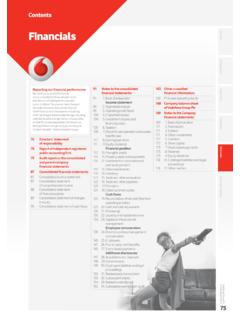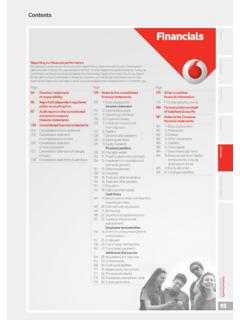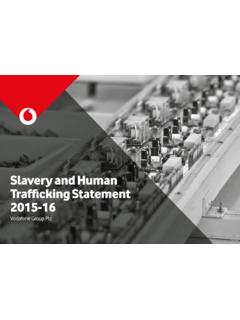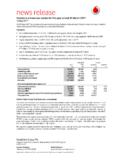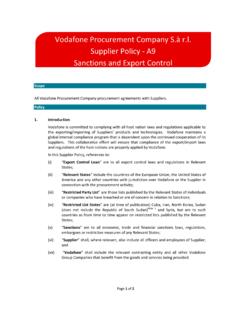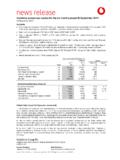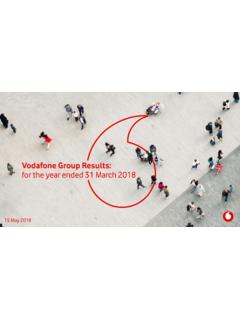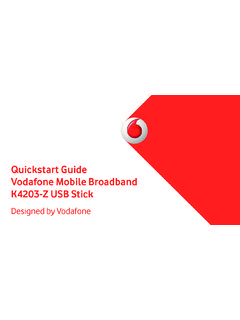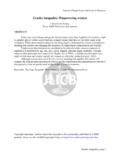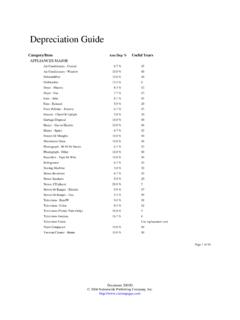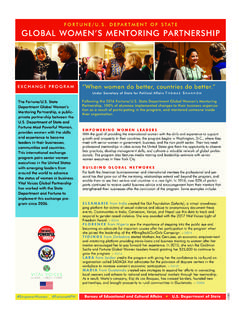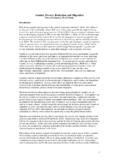Transcription of Women’s Empowerment - Vodafone
1 By empowering women and promoting gender equality we can enable communities, economies and businesses including our own to sEmpowermentConnecting womenBy 2025, we will seek to connect 50 million women living in emerging markets to help improve their lives and livelihoodsIncreasing diversityOur ambition is for Vodafone to become the world s best employer for women by 2025 Gender balanceWe aim to improve our gender balance to ensure women hold at least 30% of senior rolesVodafone Sustainable Business Report2015 -16 Introduction | women s Empowerment | Energy Innovation | Youth Skills and Jobs | Principles and Practice | Supply Chain Integrity and Safety | Mobiles, Masts and Health | Appendixhowever, comparatively few progress their careers at the same pace as their male peers. There is a leaky pipeline of talent in which women and men enter the workplace as young adults in broadly equal numbers but female representation decreases at more senior UN Sustainable Development Goals recognise that gender equality is core to the functioning of modern society.
2 Measures designed to enable women and girls to thrive alongside men and boys can improve public health, increase productivity and grow prosperity, potentially increasing GDP in certain countries by up to 34%.4 Communications technology has a critical role to play in achieving those objectives. Mobile phones represent independence for many women and girls. Even a basic mobile provides a woman with the freedom to communicate, ask for help, learn, set up and run a business and as we explain later in this section achieve financial security. For that reason, in the most patriarchal of cultures it is not unusual for men to seek to control or deny access to mobile phones for their wives and daughters. Equality of opportunity between men and women is a key indicator of long-term social stability and economic prosperity. Over the last two decades, there has been significant progress in closing the global gender gap: for example, more girls are attending school than ever before and there has been a large reduction in the number of mothers dying in , major challenges remain.
3 UNESCO has found that more than 60 million girls worldwide are out of school. Evidence suggests that women are more likely to live in poverty than men and it is estimated that every year there are more than 250,000 maternal deaths and million new-born infant deaths that would have been averted if the appropriate healthcare services had been available. Many women are economically disadvantaged compared with men: less likely to be engaged in formal work, paid less, less likely to set up a business and less able to benefit from education and training as a consequence of the burden of domestic labour. While the gender gap is more visible in emerging markets particularly where reinforced by cultural norms there are also systemic challenges in even the most advanced economies. women account for almost half of all roles in the workplace in developed countries; women s Empowerment The global contextMobile technologies also enhance a wide range of public services and economic activities of direct relevance to women and girls in emerging markets, from disease control and maternal healthcare to increased crop yields for smallholding farmers and mobile banking financial services for self-employed homeworkers.
4 Many of these applications are life-changing for women ; some of them are also is estimated that more than billion women in low- and middle-income countries do not own a mobile phone. If you are a woman, you are 14% less likely to own a mobile than a man; worldwide, that equates to approximately 200 million fewer women than men who can use a mobile to manage their daily lives and seek opportunities to grow and learn. Some of the reasons for this are economic; however, many are linked to cultural the mobile gender gap would have a significantly positive socio-economic impact for the reasons explained above. There are also good financial reasons for the mobile industry to focus on this objective; it is estimated that connecting more women (and increasing the mobile usage of existing women customers) to reach parity with men could enhance industry revenues by around $170 billion from 2015 to There is therefore a very strong alignment between a critical societal need and a global industry commercial opportunity.
5 200 millionfewer women than men own a mobile phone worldwideWomen s Empowerment | Vodafone Group Plc Sustainable Business Report 2015 -168We are one of the largest mobile operators in India and Sub-Saharan Africa. Our emerging markets businesses serve more than 330 million mobile customers, an estimated 125 million of whom are women . As we explain later in this section, Vodafone created the world s leading mobile money transfer service, M-Pesa, which enables men and women in poorer countries to benefit from simple and secure financial transactions and microfinance services. We have developed mobile technologies that are now integrated within critical public healthcare programmes in a number of emerging markets. Our technologies are also used to enhance productivity across a wide range of enterprises and industries with high levels of female employ more than 107,000 people across 26 countries and are one of the largest foreign investors in many of the countries in which we operate.
6 We also provide employment opportunities for hundreds of thousands of people across our global supplier base of more than 15,000 companies. We have a strong commitment to diversity and women s Empowerment within our own business and believe the initiatives underway to achieve greater gender parity will strengthen our company significantly over also believe we should demonstrate leadership as a beacon employer in each of the countries in which we operate through our efforts to accelerate the progress towards gender equality within our own workforce. Our intention by 2025 is to become the best employer of women in the world. If we are successful in that aim, we believe it is likely that other companies will seek to emulate the measures we are putting in place, thereby expanding the range of opportunities for women across the broader working explained in the Introduction, we have therefore identified women s Empowerment as one of our three core global transformation goals over the ten years to commitment begins at the top of the company.
7 Vodafone s diversity and gender equality activities are overseen by the Vodafone Group Plc Board and are led directly by our Group Chief Executive. Additionally, the emerging markets programmes covered in this section are led by our Chief Executive for the Africa, Middle East and Asia-Pacific used to go to school until a few years ago. She struggled with reading and writing but had no way of getting additional support to improve her learning. Suhani s parents thought that she wasn t gaining much from education so they took her out of school. At the age of 12, her tasks were confined to cooking, cleaning, fetching water and taking care of her younger siblings at home. More than three million girls like Suhani are no longer in school in India. More than 350,000 of them are in the state of Rajasthan, where 40% of girls leave school before the age of 11 and one in two girls is married before the legal age of Vodafone India and the Vodafone Foundation are working in partnership with Educate Girls, an NGO concerned with keeping girls in Rajasthan in school for longer.
8 Through the #Selfies4 School campaign in 2014-15, we promised to send 10 girls to school for every selfie that was uploaded on Facebook and Twitter. We received more than 5,800 selfies from all around India, more than double our original target of 2,500, while raising awareness on social media about the importance of educating girls. Building on the success of this campaign, Vodafone India s employees and customers raised 163,000 through donations and charitable giving sufficient to send 62,000 girls to school for one academic year. To date, Vodafone India has supported more than 120,000 girls like Suhani, enabling them to benefit from the education they need and and women s empowermentEducating girls in India Vodafone s contribution will go a long way as Educate Girls attempts to reach more than 3 million children across 27,000 schools in Rajasthan. Safeena Husain, Founder and Executive Director, Educate GirlsOur aspiration: to be the best employer for women in the worldImage courtesy of Educate GirlsWomen s Empowerment | Vodafone Group Plc Sustainable Business Report 2015 -169 Changing women s lives through mobileWe have set ourselves two parallel goals across our businesses: to expand the benefits of mobile to a greater number of women at all levels of society through a range of targeted commercial programmes; and to use our mobile technologies to enhance the quality of women s lives in three key aspects: enabling financial inclusion; improving health and wellbeing; and building skills and believe our actions between now and 2025 will make a material difference to women , families, communities and national economies across the countries in which we operate.
9 Over the next decade, we will seek to help 50 million women join the emerging markets mobile revolution. Achieving these goals would have significant multiplier effects throughout the societies in which we operate. For example, girls growing up in a household in which their mother was empowered through mobile to communicate freely on her own terms as well as potentially manage her own business and oversee the family s finances would have a very different role model to the current norm in some financial inclusionMore than billion people in low- and middle-income countries do not have access to conventional banking services. The majority of them are 2007, Vodafone and our Kenyan affiliate Safaricom developed the first mobile money transfer service M-Pesa. M-Pesa is simple to operate (payments are transmitted and received using technology available on even the most basic of 2G mobile phones), highly secure (transactions are protected with enterprise-grade encryption) and cheap and convenient.
10 Worldwide, there are now more than billion M-Pesa transactions every year and in countries such as Kenya and Tanzania the service has largely replaced cash in many people s daily lives. M-Pesa now has more than 25 million active users. With a mobile phone and an active M-Pesa account, even people on very low incomes gain control over their financial affairs. For example, their exposure to common risks in a low-income, cash-based society such as street robbery and petty corruption is significantly reduced. M-Pesa is used to manage business transactions big and small, from the weekly shopping in a Nairobi market to the purchase of cotton for an Indian textile collective. We also offer microfinance services as part of M-Pesa: M-Shwari in Kenya and M-Pawa in Tanzania provide access to advanced financial services such as savings and insurance products and hire purchase some cultures and demographics, women are responsible for running the household but have little or no ability to manage the money without which the household cannot function.
